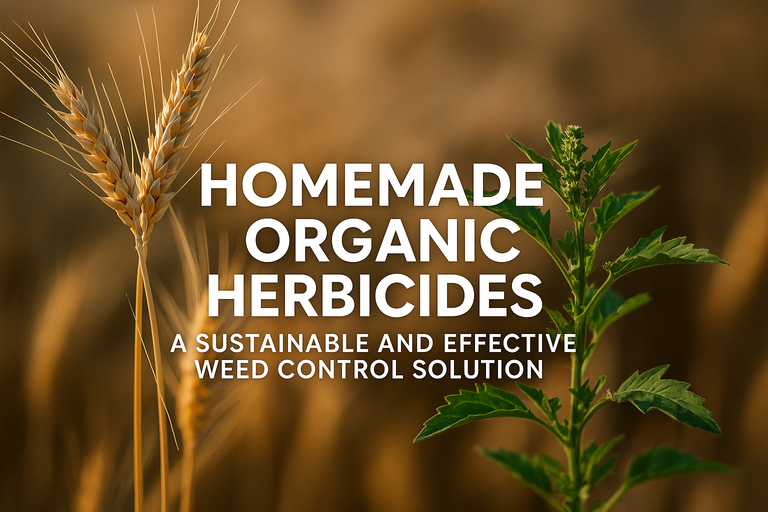As an environmentally conscious gardener, I've always struggled with the dilemma of weed control. My compound isn't paved, and during the rainy season, weeds seem to reappear with frustrating speed, sometimes within just two to three weeks after manual removal. While synthetic herbicides offer a quick fix, their potential harm to the ecosystem and my family's health makes them a last resort. This led me on a journey to discover effective organic alternatives that can be made from simple household ingredients, and I'd love to share what I've learned while also hearing about your experiences.
The Appeal of Organic Herbicides
What makes organic herbicides so compelling is their alignment with sustainable living. Unlike their chemical counterparts, these natural solutions break down without leaving harmful residues, protecting both soil health and local waterways. They're safer for children and pets, and they preserve beneficial insects like bees and earthworms that are vital to a thriving garden. While they may require more frequent application, the peace of mind they offer is worth the extra effort. The challenge, of course, is finding the most effective recipe, one that balances potency with environmental safety.
Vinegar: A Powerful Natural Weed Killer
One of the most promising solutions I've found is a vinegar-based herbicide. The acetic acid in vinegar acts as a desiccant, rapidly drying out weeds upon contact. A simple mixture of one gallon of white vinegar (preferably 10-20% concentration for tougher weeds), a cup of salt, and a tablespoon of liquid dish soap creates a potent spray that's both affordable and fast-acting. The soap helps the solution cling to leaves, while the salt enhances its weed-killing power. However, I've heard mixed reviews about its long-term effectiveness, especially for deep-rooted weeds, and its non-selective nature means it can harm nearby plants if not applied carefully. Have any of you used this method? Did you find it effective, or did weeds return quickly?
Boiling Water: Simplicity at Its Best
For those who prefer a completely chemical-free approach, boiling water is remarkably effective. Pouring it directly onto weeds scalds the leaves and roots, causing immediate damage. It's ideal for driveways, walkways, and other areas where precision isn't critical. The downside is that it's a temporary solution; some weeds may regrow if their roots survive the heat. Still, its simplicity is appealing, especially for small-scale weed problems. Has anyone used this method consistently? How often do you find yourself reapplying it?

Saltwater: A Double-Edged Sword
Saltwater is another powerful weed killer, as salt disrupts plants' water uptake, leading to dehydration. A hypertonic salt solution will dehydrate out plant cells quickly. A solution of one part salt dissolved in two parts hot water, with a few drops of dish soap for adhesion, can be sprayed directly onto weeds. While effective, salt can accumulate in the soil over time, rendering it infertile. This makes it best suited for non-garden areas like patios or between pavers. If you've used saltwater, how did you manage its impact on the surrounding soil?
Essential Oils: Nature's Herbicides
For a more aromatic approach, essential oils like clove and citrus can be mixed with vinegar and soap to create a natural herbicide. These oils contain compounds that break down plant cell membranes, making them effective against young weeds. The recipe I found combines one cup of vinegar, ten drops each of clove and citrus oil, and a teaspoon of dish soap. While this method is pleasant to use, it can be more expensive than others, and its effectiveness may vary. Has anyone experimented with essential oil herbicides? Were they worth the cost?
Corn Gluten Meal: Preventing Weeds Before They Start
Unlike the other methods, corn gluten meal works as a pre-emergent, preventing weed seeds from germinating. Applied at a rate of about 20 pounds per 1,000 square feet and lightly watered in, it's a natural way to reduce future weed growth. It even doubles as a fertilizer, adding nitrogen to the soil. However, it won't kill existing weeds, so it's best used as part of a broader weed management strategy. Have any of you incorporated corn gluten meal into your gardening routine? How did it work in combination with other methods?
Finding the Right Balance
As I consider which method to adopt, I'm torn between the immediate results of vinegar and the long-term benefits of corn gluten meal. Perhaps the best approach is a combination, using vinegar for quick knockdowns while applying corn gluten meal to prevent regrowth. But I'd love to hear from this community. What has worked best for you? Have you found a particular method or combination that strikes the perfect balance between effectiveness and sustainability?
Gardening is as much about sharing knowledge as it is about nurturing plants. Your experiences could help me and others make more informed choices about organic weed control. Whether you've had success with vinegar, boiling water, or another method entirely, your insights are invaluable. Let's continue this conversation and grow our gardens in harmony with nature. What's your go-to organic herbicide, and why?
Resources
Here are the top 5 online resources formatted as requested:
Posted Using INLEO
This post has been shared on Reddit by @davideownzall through the HivePosh initiative.
Thanks for your contribution to the STEMsocial community. Feel free to join us on discord to get to know the rest of us!
Please consider delegating to the @stemsocial account (85% of the curation rewards are returned).
Consider setting @stemsocial as a beneficiary of this post's rewards if you would like to support the community and contribute to its mission of promoting science and education on Hive.